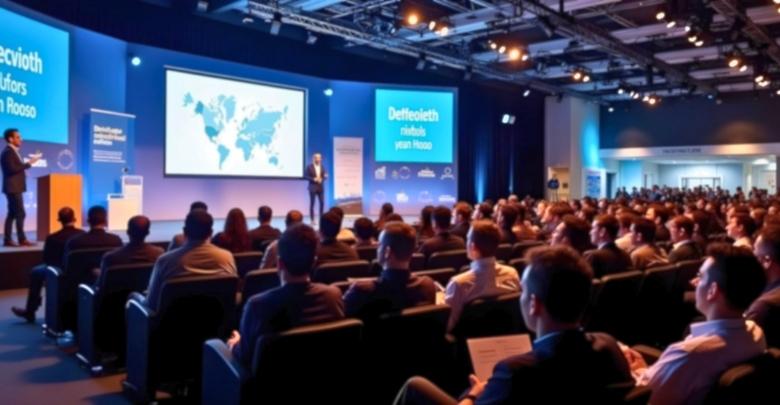Conferences in the Canadian humanities bring together a variety of thinkers to study philosophy, history, literature, and other subjects. These events offer a great chance to experience intellectual exchanges while connecting with Canada’s rich cultural heritage. If you’re wondering: What should I expect at a humanities conference in Canada? You’re not alone.
At a Canadian humanities conference, expect insightful keynote speeches, engaging workshops, vibrant networking opportunities, and interdisciplinary discussions. These conferences blend academic expertise with cultural experiences, creating a stimulating atmosphere. Participants present outstanding research, explore diverse topics, and engage in meaningful conversations that encourage collaboration and innovation.
Are you curious to learn more about what these events offer? Keep reading to discover everything you need to know about attending a humanities conference in Canada and making the most of it.
Development of Canadian Humanities Conferences
The evolution of Canadian humanities conferences reflects the country’s commitment to encouraging intellectual exchange and cultural awareness. Over the decades, these gatherings have grown in both size and scope, offering platforms for scholars to share insights across diverse fields such as literature, philosophy, and history. This vibrant academic tradition underscores Canada’s dedication to promoting interdisciplinary dialogue and innovation.
One of the hallmarks of these conferences is inclusivity. They welcome participants from various academic backgrounds, creating opportunities for networking and collaboration. Scholars often present innovative research, sparking discussions that challenge conventional perspectives. Such interactions not only enrich academic discourse but also contribute to shaping the future of the humanities in Canada and beyond.
For researchers worldwide, attending international humanities conferences in Canada provides an excellent opportunity to engage with a diverse academic community. These events create meaningful connections and open doors to collaborative projects. By participating, attendees gain fresh perspectives while experiencing Canada’s rich cultural and intellectual heritage.
What Should I Expect at a Humanities Conference in Canada?
Engaging with minds from diverse areas of the humanities can broaden awareness and inspire fresh ideas. Canadian humanities conferences offer an interactive experience filled with intellectual stimulation, cultural exploration, and networking opportunities. Dive into the details below to find more!

Vibrant Networking Opportunities
The conference environment is buzzing with opportunities to meet individuals from various disciplines and backgrounds. Casual meet-ups during breaks or structured networking events allow attendees to exchange ideas and form connections. Whether new to the field or an experienced scholar, everyone finds value in these moments.
Engaging Workshops
Workshops provide interactive spaces for participants to improve skills, share knowledge, and collaborate on projects. Experts lead sessions on diverse topics, encouraging hands-on learning and active participation. Attendees leave these workshops equipped with practical tools and a fresh perspective on their academic or professional development.
Insightful Keynote Speeches
Keynote speeches feature influential thinkers sharing different perspectives on relevant themes. These talks are often the highlight of the conference, blending inspiration with thought-provoking content. Audiences gain new insights and a deeper knowledge of pressing issues, leaving them motivated to explore further.
Thoughtful Poster Sessions
Research is presented in a fascinating and capturing way through poster sessions, which blend academic insights with visual components. Presenters discuss their work with attendees in a more informal setting. This setup encourages meaningful conversations, constructive feedback, and the exchange of innovative ideas.
Dynamic Presentations and Discussions
Presentations take center stage at humanities conferences, offering a platform for new ideas and thoughtful dialogue. Attendees witness researchers sharing impactful findings, engaging audiences with well-crafted arguments and lively visuals. The diverse types of presentations at humanities conferences open up connections and debates, enriching perspectives and encouraging critical thinking among participants.
A variety of Panel Discussions
Experts from different fields discuss complex issues and provide varying perspectives on panels. These sessions encourage dialogue and encourage attendees to think about topics from multiple perspectives. The dynamic interplay of ideas creates a richer knowledge of the themes being explored.
Collaborative Networking Dinners
Evening gatherings such as networking dinners provide a relaxed environment to connect beyond formal sessions. These events often blend academic conversations with casual discussions, offering a space to build meaningful professional relationships. Shared meals create opportunities for unique and memorable interactions.
Access to New Publications
Publishers and authors often showcase their latest work at these conferences, giving attendees access to fresh resources. From journals to books, these exhibits provide opportunities to explore advanced research. This access ensures participants stay updated with developments in their areas of interest.
Diverse Cultural Experiences
Conferences in Canada often highlight the country’s rich culture through local art, food, and performances. These experiences provide a refreshing break from academic discussions while promoting a deeper appreciation of Canadian heritage. Participants enjoy a balanced mix of intellectual and cultural enrichment.
Taking part in a humanities conference in Canada is an enriching experience that blends intellectual growth and meaningful interactions. This journey offers fresh insights, valuable connections, and memorable moments. Prepare for an engaging time where curiosity meets collaboration.
Who Usually Attends Humanities Conferences in Canada?
In Canada, a wide range of people from different backgrounds and fields attend humanities conferences. These gatherings are lively, with people sharing ideas, research, and experiences. The collaborative environment makes these events ideal for networking and professional growth. Below are the types of people you’ll find at these conferences:
Scholars and Academics
University professors and researchers often attend to share their findings and learn from others. Presenting their research, engaging in intellectual discourse, and growing their academic networks are their main priorities. These professionals bring diverse insights from different disciplines, which enrich the discussions. Their contributions often spark new ideas and encourage collaboration among participants from various regions.
Graduate and Postgraduate Students
These conferences are actively attended by students pursuing higher education in the humanities to establish academic ties. Their presentations offer fresh perspectives, reflecting ongoing research and studies. Many students attend to gain feedback on their projects and explore future opportunities. These events help them learn directly from established experts while enhancing their academic confidence.
Independent Researchers
Various researchers, without institutional support, collaborate with like-minded individuals to explore new ideas. These participants bring unique perspectives that differ from traditional academia. Many aim to contribute innovative insights and develop personal networks. Conferences offer a space for them to validate their work and interact with academic and professional communities.
Cultural and Arts Professionals
Professionals from museums, galleries, and cultural organizations attend to connect their work with academic discourse. Their focus includes integrating theoretical knowledge into practical applications. These participants share projects that bridge academia and the arts. Their presence strengthens the connection between research and cultural practice, encouraging collaboration across creative and scholarly fields.
Enthusiasts and Lifelong Learners
People passionate about the humanities, but outside academic or professional spheres, join to expand their understanding. They bring curiosity and diverse life experiences, enriching conversations. These attendees engage actively in discussions and workshops. Many are drawn by specific topics or keynote speakers and contribute their unique perspectives to the event’s overall atmosphere.
A diverse range of people are represented at Canadian humanities conferences, each of whom adds something significant to the conversations. This vibrant mix of participants ensures a dynamic and enriching experience for everyone involved, promoting connections across disciplines and communities.
Canadian Humanities Conferences: What to Consider Before Attending?
Taking part in a humanities conference in Canada can be a rewarding experience for learning and connecting with others. Proper planning ensures that you gain the most value from the event. Here are key factors to consider before you attend:
Research the Conference Theme
Knowing the conference’s theme helps you align your interests with the sessions and discussions offered. Review the topics carefully and prioritize sessions relevant to your goals. Preparing ahead ensures that you make meaningful contributions and gain insights suited to your academic or professional needs.
Plan Your Travel and Accommodation
Securing travel and lodging early avoids unnecessary stress as the conference date approaches. Consider the event’s location and check nearby accommodations that fit your budget. Early planning also ensures proximity to the venue, saving you time and energy during the conference days.
Prepare Your Presentation Materials
If presenting, ensure your materials are polished and specifically designed for the conference audience. Practice your delivery to convey ideas clearly and confidently. Preparing engaging content encourages constructive feedback and interest from attendees, helping you refine your research or project for broader impact.
Explore Funding Options
Before attending, consider how to get funding to attend a humanities conference in Canada, as these events can often have high costs associated with travel, accommodation, and registration fees. Many organizations support individuals seeking to attend such events. Research funding opportunities well in advance to cover travel, registration, or accommodation costs, reducing financial burden and ensuring participation.
Network and Engage Actively
Conferences are excellent opportunities to connect with like-minded individuals and build professional relationships. Bring business cards or prepare a concise introduction to make interactions smoother. Actively participate in discussions and workshops to leave a positive impression and make meaningful connections with others.
Careful preparation ensures you make the most of your experience at a humanities conference in Canada. By considering these factors, you can maximize opportunities for learning, networking, and showcasing your work effectively.
Tips for Making the Most of Your First Humanities Conference in Canada
It can be exciting and rewarding to attend your first humanities conference in Canada. It’s an opportunity to learn, connect, and grow as a scholar. To make the most of this event, here are some helpful tips:
- Plan Your Schedule: Make sure to review the conference agenda ahead of time. Prioritize sessions or workshops that align with your interests and academic goals.
- Be Prepared to Network: Bring business cards or a digital alternative to share your contact information. Don’t be shy to introduce yourself to others and engage in conversations.
- Take Notes During Sessions: Keep a notebook or device handy to jot down key points during presentations. This helps you remember important ideas for later discussion or research.
- Ask Questions: If you have any questions after a presentation, feel free to ask. Engaging with speakers shows interest and can lead to valuable discussions.
- Attend Social Events: Conferences often include social gatherings or informal meetups. These events are great opportunities to network and relax while continuing academic conversations.
- Join Group Discussions: Many conferences offer smaller group discussions or roundtables. Participate actively to share your ideas and hear from others in a more intimate setting.
- Don’t Overload Your Schedule: It’s easy to get excited about all the sessions, but try not to attend every event. Balance between sessions and downtime to avoid burnout.
- Prepare an Introduction Speech: Create a short, clear introduction to explain your research or interests. This will help when meeting new people and sharing what you’re passionate about.
- Follow Up After the Conference: Stay in touch with people you meet by sending a brief email or LinkedIn message. Building relationships beyond the event can lead to future opportunities.
- Be Open-Minded: Even if they are not directly related to your area of interest, be open to new ideas. Conferences are places to explore different perspectives and expand your knowledge.
Participating in your first conference can be a valuable experience for personal and professional growth. By following these tips, you can ensure that your time is well spent, leaving you with new knowledge, connections, and inspiration for your future endeavors.
FAQs About What Should I Expect at a Humanities Conference in Canada?
Below are common questions about what you can expect when attending a humanities conference in Canada. These FAQs address practical aspects, amazing opportunities, and ways to navigate these enriching academic gatherings.
What Are the Registration Requirements for a Humanities Conference in Canada?
Most conferences require participants to register online through their official website. Registration typically involves filling out personal information, selecting sessions, and paying a fee. Early registration often provides discounts, while some conferences offer free entry for students or underfunded researchers. Be sure to check deadlines and payment details to secure your spot.
Are Humanities Conferences in Canada Open to Non-Academics?
Yes, these conferences often welcome enthusiasts, independent researchers, and cultural professionals alongside academics. Many sessions and workshops are designed to be accessible to a wide audience. Attendees from various fields can engage with topics and share their perspectives, creating a diverse environment that encourages learning and meaningful connections.
How Should I Prepare for a Conference Presentation?
Prepare a clear, engaging presentation that fits within the allotted time. Practice your delivery to ensure clarity and confidence. Use visuals like slides to complement your points but avoid overwhelming your audience with text. Being well-prepared helps you engage attendees and invite valuable feedback on your research or project.
What Are Some Common Etiquette Tips for Conference Attendees?
Respect time limits during presentations and discussions, and keep questions concise and relevant. Networking events require a professional yet approachable demeanor. Avoid dominating conversations or interrupting speakers. Follow the event’s guidelines and engage with participants respectfully, whether during formal sessions or casual interactions at social events.
Are There Volunteer Opportunities at Humanities Conferences?
Many conferences offer volunteer roles like assisting with registration, managing sessions, or helping attendees. One of the best ways to network, learn behind the scenes, and attend sessions for free or at a reduced cost is to volunteer. Check the conference website for volunteer applications and apply early to secure a spot.
Can I Submit Creative Work for Presentation at a Humanities Conference?
Some humanities conferences accept creative submissions like poetry, art installations, or performances. These works are often presented alongside traditional research to enrich the program. Ensure your submission aligns with the conference’s theme and guidelines. Creative presentations provide a great platform to showcase innovative approaches to humanities topics.
End Note
Humanities conferences in Canada offer a rich blend of intellectual growth, cultural exchange, and professional networking. Attendees can expect dynamic presentations, insightful workshops, and opportunities to connect with like-minded individuals. Simply put, they deliver an inspiring and enriching experience, answering the question: What should I expect at a humanities conference in Canada?
As you prepare to attend, remember to engage actively, keep an open mind, and maximize every opportunity to learn and connect. Balance your schedule, participate in discussions, and enjoy the experience fully. With preparation and enthusiasm, your conference trip will be both rewarding and memorable. Best wishes for a successful and inspiring event!







